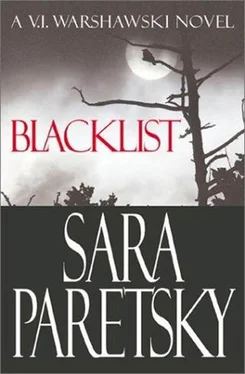“I know we had an appointment for tomorrow afternoon,” I said, “but I had Edwards Bayard with me this afternoon and he told me an odd tale.” “Edwards? I suppose he came out here because of the girl.”
“Among other things. Do you know, I actually found him in Olin Taverner’s apartment Thursday night? He had broken in, trying to find some secret papers that Taverner had promised him.”
“How extraordinary. And did he find the papers?” She did a good job, keeping a tone of light interest in her flutey voice, but her hands had clenched at her sides.
“No.” I waited for her hands to relax before adding, “but he did tell me about a letter he found from your mother to Calvin Bayard.”
“And I suppose you drove out here to tell me about it?” Her hands tightened again, but she still managed to keep her voice steady.
“Your mother wrote Calvin about depredations he was committing against her household, and a demand for restitution-or she would take action.”
The light bouncing from her heavy glasses made it impossible for me to see Geraldine’s eyes. “Mother thought she was a law unto herself. She defined theft according to her own canons.”
“And?” I prompted, when she fell silent again.
“I wrote a check for Calvin to one of his pet charities. It was a group Mother disapproved of, because it provided assistance to indigent Negroes
who needed legal assistance.” She gave one of her involuntary glances at the full-length portrait behind her. “I was fortyfive years old, but she still thought it within her rights to examine my bank statement when it arrived each month. I didn’t realize she was doing it until she confronted me over this check; for once I held my ground with her. I should have realized she would next turn to Calvin.”
“She had such strong anti-black prejudices?” I was bewildered. Geraldine Graham gave a tight little smile. “She had such strong feelings against her will being thwarted that I imagine she lost sight of the original issue.
“She threatened Mr. Bayard with reprisals. What would those have been?” “Mother owned shares in Bayard Publishing. She was always threatening to sell them to Olin, who was her nephew, or to will them to him, whenever Calvin published something she thought was risqu &. It was a hollow threat-she disapproved of Olin’s sexual proclivities far more than she did of Calvin’s daring authors. How odd it seems that Calvin’s authors were once considered daring, now that every sexual act is described in such detail that they all become merely boring. Not to mention how they appear in films. Men like Armand Pelletier, who were glamorized for their bold language, have become passe.”
“Why was Lisa so determined I shouldn’t talk to you about this?” I refused to be diverted. “She accused me of working for the newspapers, trying to dig up old dirt.”
“That’s right, madam.” Lisa popped into the room from her self-appointed listening post. “I remember well what Mrs. Drummond went through when Mr. MacKenzie passed, the work to keep-“
“That will do, Lisa. Miss Victoria is trying to find out who killed the Negro writer in our pond. She has no prurient interest in my affairs and we have nothing to hide from her.”
The last phrase was uttered like a warning, like a way of saying, our hand is so much quicker than her eye, that you can speak of everything, except the elephant in the drawing room which she can’t see. Lisa muttered something that might have been an apology. She retreated to the edge of the carpet, but she didn’t leave the room.
“No one seemed to think I might mourn MacKenzie when he died, but
his death marked the end of many things for me,” Geraldine added for me. “To my mother, his death was one more inconvenience he had caused her: odd, when you consider that my marriage to him was her idea. Hers and MacKenzie’s father’s. Mr. Blair Graham was one of my father’s business associates, and everyone thought that marriage would settle both MacKenzie and me down, turning him from the temptations of New York City and me from those of Chicago when we started our own nursery. Children are supposed to be a woman’s greatest joy, after all. How strange that Mother would tell me that so often when I brought her no joy at all. Except perhaps the joy of exercising her will over mine.”
“Your mother didn’t think Darraugh should mourn his father’s death, either?” As always happened in talking to Geraldine, I had to struggle to keep on the subject, or to remember what the subject was. “Was that why Darraugh ran away from school when your husband died?”
Geraldine’s hands began to pleat the stiff fabric of her skirt. “My mother was still alive when Darraugh’s son was born. She took his naming the boy `MacKenzie’ as a personal insult, rather than a tribute to a well-loved parent. She thought Darraugh ought to name the boy Matthew for my father. Or even call him after her own father. Virgil Fabian Taverner-he was named during the Victorian fashion for all things Roman. Be that as it may, Mother rewrote her will a few days after MacKenzie’s baptism. None of the boy’s charms, and my grandson has always had most winning ways, could persuade Mother not to punish Darraugh through his son.”
“I know young MacKenzie; he does have a lot of charm. What was the charity your mother took such exception to?”
She didn’t understand what I was talking about at first. When I reminded her that she had written a check to one of Calvin Bayard’s charities, she again stiffened, but said, “How strange that I can’t remember. At the time it seemed of consuming importance-my action, Mother’s intrusiveness. And yet, the memory has vanished like some long-since plucked fruit.”
“It wasn’t the Committee for Social Thought and Justice? Renee Bayard said that was one that your cousin Olin was particularly determined to prove a Communist front.”
She shook her head again. “Young woman, you must be now the age I was then. Everything seems fresh and clear in your mind’s eye, but if you
live to my great age, you will find that the past becomes such a broad landscape that many memories, even precious ones, get hidden under leaves and hillocks. You will have to excuse me now. Conversation fatigues me as it didn’t formerly.”
I got up to leave; Lisa smiled in triumph.
“You’re very kind to have taken the time. How did Mr. Bayard come to be involved with Mr. Llewellyn to the extent of providing the money he needed to start his own publishing firm?” I asked.
“I was never involved in the business life of New Solway’s businessmen. When I was a young woman, we were supposed to be decorative, not to have heads for great affairs.”
I shook off Lisa’s arm as she tried to steer me to the door. “Did Mr. Llewellyn support the same charity that you did?”
She shook her head. “I wouldn’t know, young woman. It’s possible. But it was all a long time ago, in another country.”
Ms. Graham often dotted her speech with what sounded like quotations that I didn’t recognize. I knew this one. As I put my shoes on in the building’s foyer, I could even supply the missing second part of it: besides, the wench is dead.
I didn’t think Geraldine had forgotten anything: the name of the charity, why her mother had objected so strongly or even how Calvin Bayard came to support Llewellyn. But for whatever reason, Geraldine thought the person she’d been in those days was dead. Her mother had triumphed-her mother’s portrait hung over her head day after day to remind her.
How had she spent her days back then, while Mrs. Drummond ran Larchmont? Maybe she’d thrown herself into motherhood and amateur dramatics, or county politics. Marriage had been supposed to settle both her and MacKenzie Graham. I remembered again the articles describing her return from Europe in the early thirties, looking “interestingly thin.” She’d slept around, gotten pregnant, gone to Switzerland for an abortion? And MacKenzie? What form had his New York City peccadilloes taken?
Читать дальше












